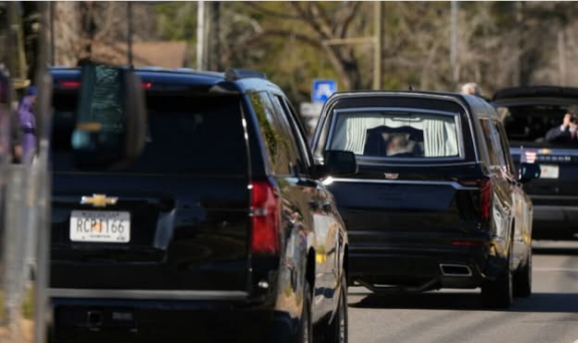
By Adeyemi Adekunle
The six-day funeral of former U.S. President Jimmy Carter began on Saturday, as his flag-draped casket made its way through the heart of his hometown, Plains, Georgia. This solemn procession marked the beginning of a national farewell to a man whose contributions to global peace, humanitarian efforts, and democracy shaped the course of history. Carter, who passed away on December 29, 2024, at the age of 100, will be remembered for his groundbreaking efforts both in the White House and beyond.
The journey started at Phoebe Sumter Medical Center in Americus, Georgia, where current and former Secret Service agents, who had protected Carter throughout his life, respectfully walked alongside his remains. The hearse then rolled through Plains, past landmarks significant to Carter’s life, including the family peanut warehouse and the simple home where Jimmy and his late wife, Rosalynn, had lived for much of their lives. The procession moved slowly, allowing mourners—some of whom had traveled from distant states—to pay their respects. Among them was 12-year-old Will Porter Shelbrock, who expressed admiration for Carter’s early work on climate change and his fight for human rights. “He was ahead of his time,” said Porter Shelbrock, who had been born decades after Carter’s presidency.
The motorcade continued its journey through Plains, where it passed the home where the Carter family had lived before Carter’s first Senate campaign in 1962. It also passed the old train depot where Carter’s 1976 presidential campaign began, reflecting his humble origins and the grassroots nature of his political rise.
The procession then reached the home where Carter and his late wife, Rosalynn, had passed away. This home, built before his Senate bid, had served as a place of comfort and rest for the couple throughout their extraordinary lives. The house remained their home after Carter’s presidential tenure, symbolizing his commitment to family and the place that shaped him.
At the National Park Service tribute in front of Carter’s family farm, part of the Jimmy Carter National Historical Park, rangers stood in formation as the farm bell rang 39 times, honoring Carter’s legacy as the 39th president of the United States. The area was once without running water or electricity, providing a stark reminder of the humble beginnings that shaped his perspective and policies.
Carter’s experience growing up in the rural South, surrounded by systemic poverty and racial injustice, deeply influenced his future work, especially his advocacy for human rights and global peace.
Reflecting on his upbringing, Carter often spoke about the hardships he faced during the Great Depression and the lessons he learned from witnessing institutional racism in his community. These formative years laid the foundation for his policies, both as a president and a global advocate for human rights and democracy. His devotion to these causes did not stop after leaving the White House.
Carter’s post-presidential years were marked by tireless efforts to eradicate diseases, build homes through Habitat for Humanity, and mediate peace in regions affected by conflict.
On Saturday afternoon, the procession moved on to the Georgia State Capitol, where a brief moment of silence was observed in honor of Carter’s contributions to the state and the nation. The motorcade then continued to the Carter Presidential Center in Atlanta, where Carter will lie in repose until Tuesday morning.Afterward, his remains will be transported to Washington, D.C., for a state funeral at the U.S. Capitol, where he will lie in state until the funeral ceremony at Washington National Cathedral on Thursday.
Following the state funeral, Carter will return to Plains for a private, invitation-only service at Maranatha Baptist Church, where he will be laid to rest next to his beloved wife Rosalynn. This final resting place, near their home in Plains, will symbolize the life of a man who remained rooted in his humble beginnings and dedicated his entire life to the service of others.
Carter’s funeral procession reflects his legacy as a man of the people, someone whose rise from a small, rural town to the presidency was marked by a commitment to both his community and the global stage. His time in office may have ended in 1981, but his life of service continued long after, and his impact on the world will be remembered for generations to come.
The farewell to Jimmy Carter is not just the end of an era in American politics but the end of a life that exemplified selflessness, compassion, and an unwavering commitment to making the world a better place. The memories of his presidency, humanitarian efforts, and relentless pursuit of peace will live on, just as the man himself did—humble, resolute, and dedicated to others.



